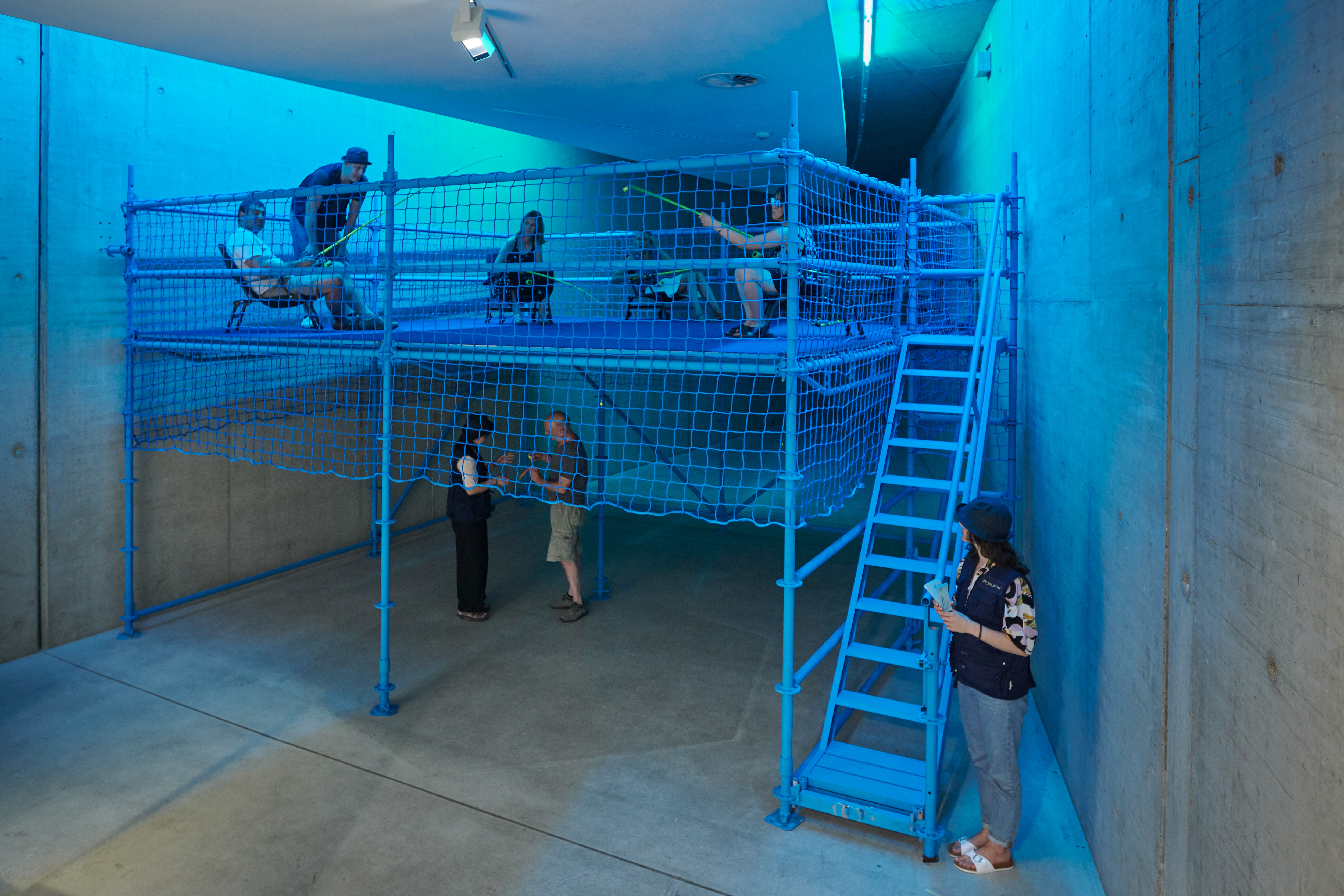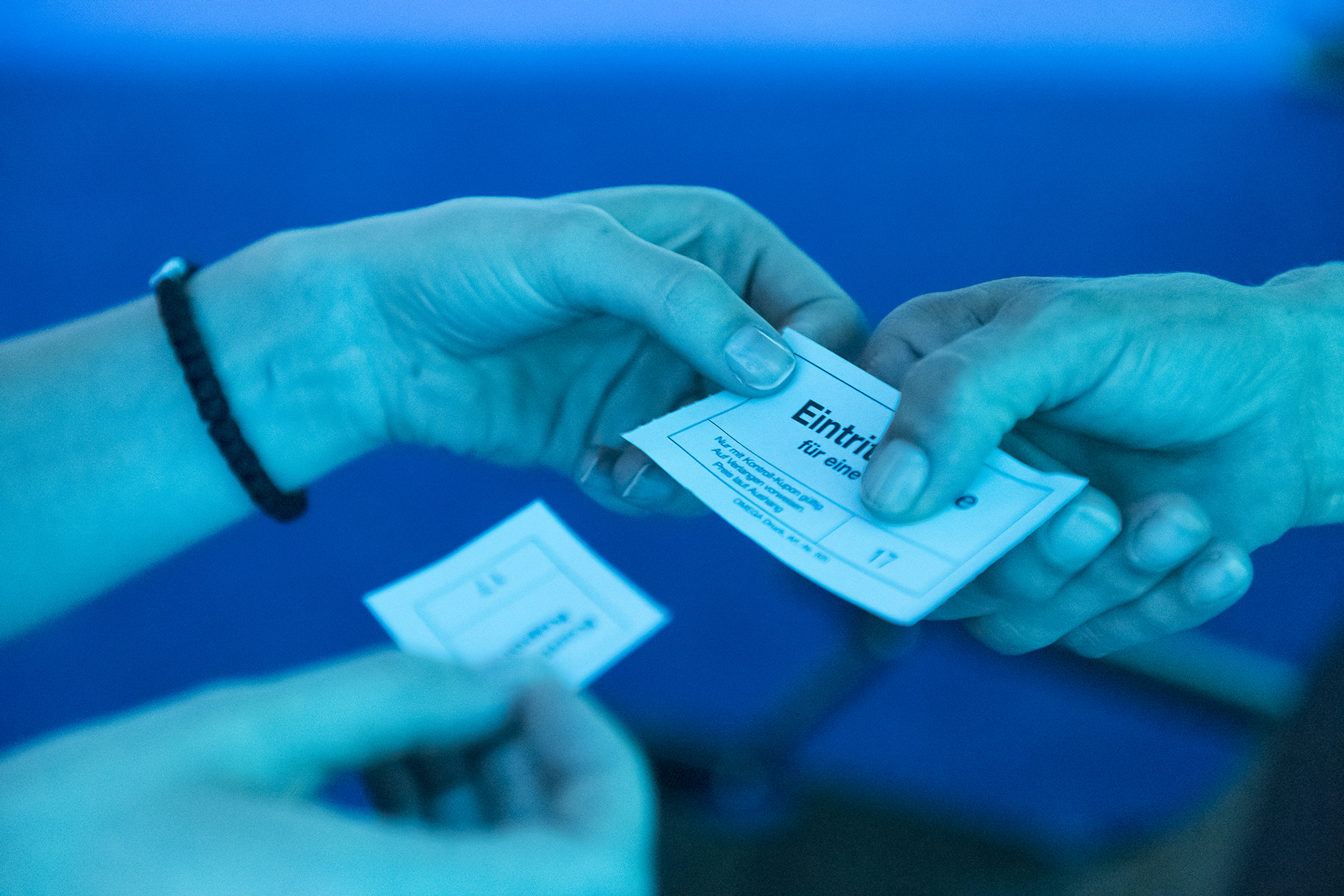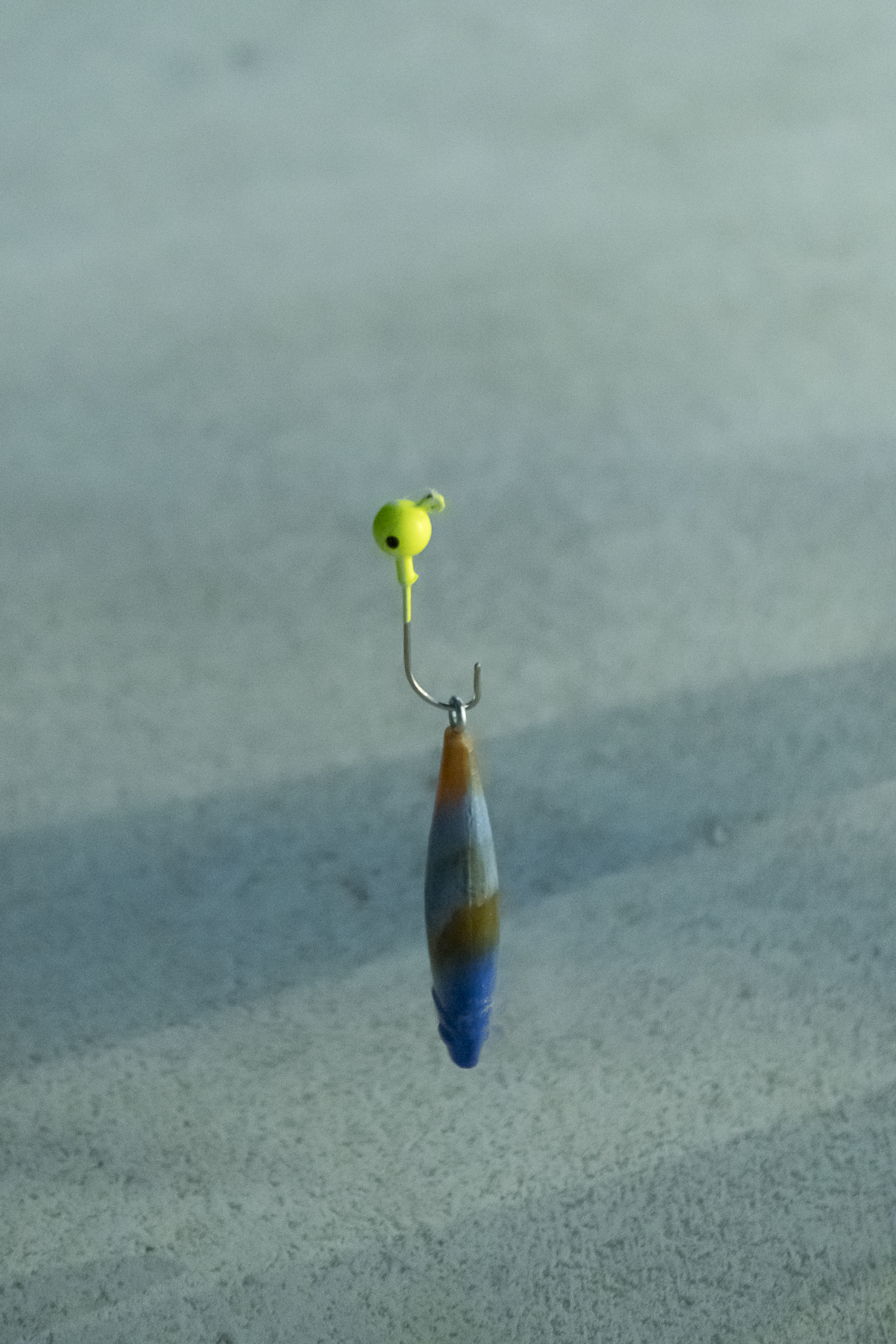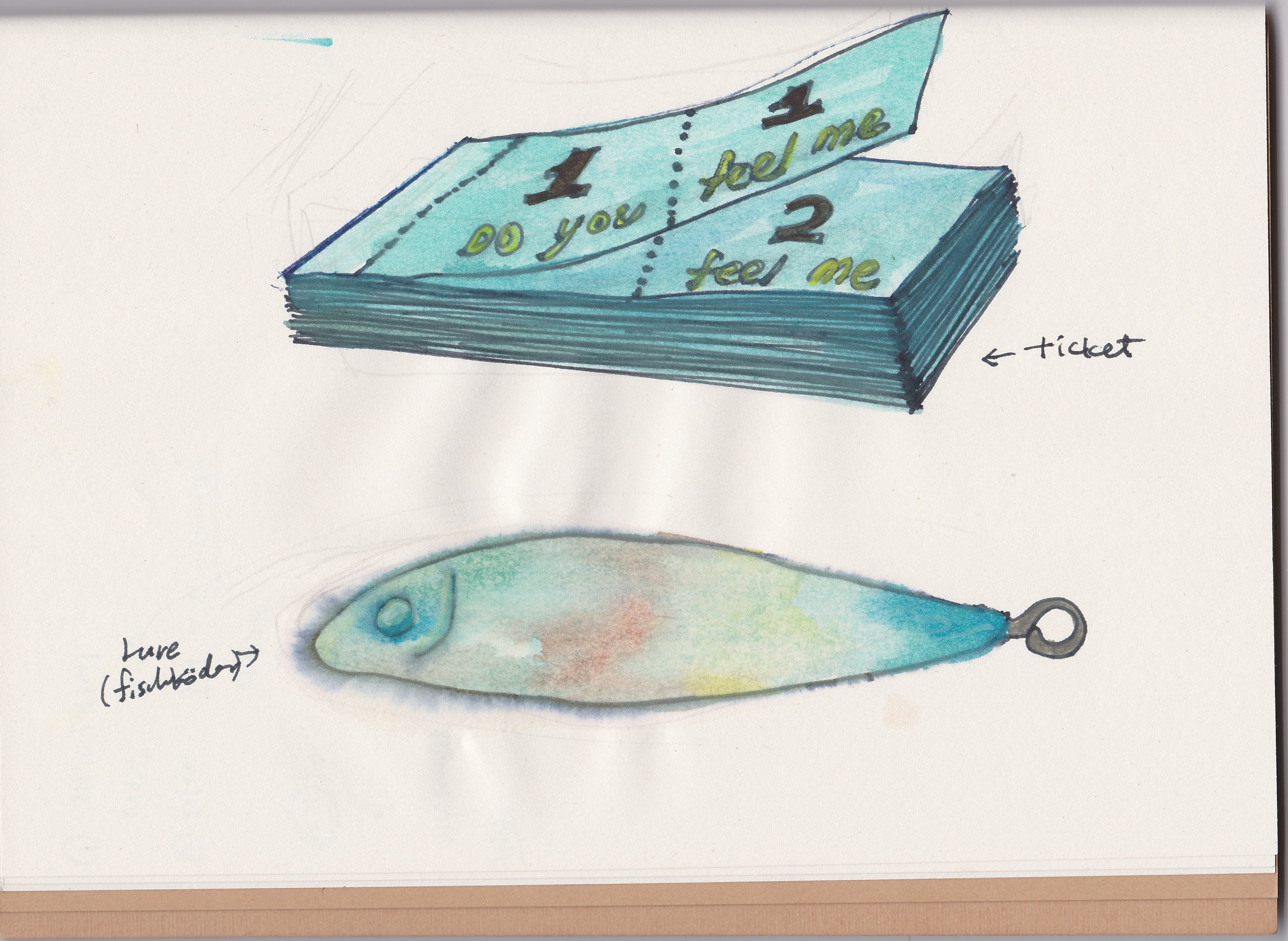Do You Feel Me
This is a fishing spot.
![]()
![]()
![]()
![]()
![]()
![]()
![]()
My feet try to leave the black floorboards as silently as possible to immerse myself in a radiant blue. In front of me is a young woman in full fishing gear, pointing to a wall text and asking if I want to be a fisher or a giver. "This is a fishing spot," says the text on the wall. The artful, colourful fish in the display case distract me from reading, and I quickly say, "Fischer." She gets a pad of tickets and rips off the one with the number 31, gives it to me, and invites me up to the fishing spot. Via a staircase I reach the soft carpet of a platform covered in blue. There another performer awaits me, who takes my ticket and tears it, then leads me to a fishing chair and hands me a neon yellow fishing rod. I fall deep into the seat and listen to the performer's explanation, "If you notice a jerk on the rod, reel up the line very slowly.
"Selflessness in thinking and acting is the driving force behind Ji hyung Song's artistic exploration. The principle of reciprocity, of giving and taking, is questioned from an unconventional perspective when experiencing the work Do You Feel Me. The expression "Do you feel me?". which is used as an interjection and does not bear much meaning on its own, is more complex than it first seems. After all, it addresses a counterpart and thus requires an interaction with the need for assurance. The expression can be understood as a give and take on a communicative level in the expression of agreement through a little "giving" gesture such as a nod. Ji hyung Song's work subtly reveals the deep-seated interactions of giving and taking and examines the social behaviour of the visitors. It starts with the decision in response to the question, "What do you want to be, a fisher or a giver?" Some fishers linger impatiently for up to half an hour on their seat and hope to pull up one of the colourful fish on the hook. The fishing platform incorporates all the essential characteristics of catching fish: through focusing on oneself and the slow passage of time, it teaches us patience and the renunciation of a constant pressure to succeed. The fishing platform invites visitors to abandon the goal oriented thinking and acting of our everyday life and to submit to a state of pleasant uncertainty.
From the two display cases with more than three hundred impressively colourful fish that Ji hyung Song made by hand, the giver can choose a fish and thus give pleasure to a fisher. Two strong pulls on the fishing line are the sign that a fish is hanging on the hook. The fish is the gift of an unknown giver, who must decide on a lowered hook underneath the platform. Fishers and givers are in indirect contact with each other and communicate even though they do not see or talk to each other.
The reversal of the prevailing power relations between humans and the environment in Do You Feel Me serves as a mirror for the visitor-whether giver or fisher-and makes it possible to reevaluate facets of powerlessness, dependence, and impatience and to feel relaxation and joy. For the encounter with oneself, Do You Feel Me requires a little time from one's life in return, since fast consumption is not possible here.
With her work, Ji hyung Song creates a fascinating interplay of large-scale installation, helping instructors, defined processes, and little give-away artworks. The visitors are the connecting link in Do You Feel Me. They fill the setting of the fishing spot with their physical presence and their behaviour and are the true performers of the work.
Text: Julia Reich
Booklet of exhibition SOMMER
![]()
![]()
![]()
This is a fishing spot.
What would you like to be, angler or giver
Angler
1. Get an admission ticket next to the fish display case.
2. Show your admission ticket before entering the fishing spot.
3. Sit in a seat of your choice, our team will explain how to proceed.
4. If you feel a pull on the fishing line, slowly wrap the fishing line.
Giver
1. Go to the fish display case. Our team will explain how you can give the angler a fish.







My feet try to leave the black floorboards as silently as possible to immerse myself in a radiant blue. In front of me is a young woman in full fishing gear, pointing to a wall text and asking if I want to be a fisher or a giver. "This is a fishing spot," says the text on the wall. The artful, colourful fish in the display case distract me from reading, and I quickly say, "Fischer." She gets a pad of tickets and rips off the one with the number 31, gives it to me, and invites me up to the fishing spot. Via a staircase I reach the soft carpet of a platform covered in blue. There another performer awaits me, who takes my ticket and tears it, then leads me to a fishing chair and hands me a neon yellow fishing rod. I fall deep into the seat and listen to the performer's explanation, "If you notice a jerk on the rod, reel up the line very slowly.
"Selflessness in thinking and acting is the driving force behind Ji hyung Song's artistic exploration. The principle of reciprocity, of giving and taking, is questioned from an unconventional perspective when experiencing the work Do You Feel Me. The expression "Do you feel me?". which is used as an interjection and does not bear much meaning on its own, is more complex than it first seems. After all, it addresses a counterpart and thus requires an interaction with the need for assurance. The expression can be understood as a give and take on a communicative level in the expression of agreement through a little "giving" gesture such as a nod. Ji hyung Song's work subtly reveals the deep-seated interactions of giving and taking and examines the social behaviour of the visitors. It starts with the decision in response to the question, "What do you want to be, a fisher or a giver?" Some fishers linger impatiently for up to half an hour on their seat and hope to pull up one of the colourful fish on the hook. The fishing platform incorporates all the essential characteristics of catching fish: through focusing on oneself and the slow passage of time, it teaches us patience and the renunciation of a constant pressure to succeed. The fishing platform invites visitors to abandon the goal oriented thinking and acting of our everyday life and to submit to a state of pleasant uncertainty.
From the two display cases with more than three hundred impressively colourful fish that Ji hyung Song made by hand, the giver can choose a fish and thus give pleasure to a fisher. Two strong pulls on the fishing line are the sign that a fish is hanging on the hook. The fish is the gift of an unknown giver, who must decide on a lowered hook underneath the platform. Fishers and givers are in indirect contact with each other and communicate even though they do not see or talk to each other.
The reversal of the prevailing power relations between humans and the environment in Do You Feel Me serves as a mirror for the visitor-whether giver or fisher-and makes it possible to reevaluate facets of powerlessness, dependence, and impatience and to feel relaxation and joy. For the encounter with oneself, Do You Feel Me requires a little time from one's life in return, since fast consumption is not possible here.
With her work, Ji hyung Song creates a fascinating interplay of large-scale installation, helping instructors, defined processes, and little give-away artworks. The visitors are the connecting link in Do You Feel Me. They fill the setting of the fishing spot with their physical presence and their behaviour and are the true performers of the work.
Text: Julia Reich
Booklet of exhibition SOMMER



Works/Exhibition History
2019
Participatory Performance
Blue scaffolding, net, carpet, 300 pieces of fish object, two vitrine(wood, plexiglass), fishing chair, fishing vest, fishing rod, hat, tickets
300x500x500 cm approx.(scaffolding), (vitrine)Dimensions variable
Performers: Ji hyung Song, Simon Ertel, Carolina Kickuth, Kyoung hyun Min, Bettina Wiehler
Photo: Ivo Faber, Katja Illner
Courtesy of KIT(Kunst im Tunnel
Exhibitions
SOMMER, KIT-Kunst im Tunnel, Düsseldorf, DE, 2019
2019
Participatory Performance
Blue scaffolding, net, carpet, 300 pieces of fish object, two vitrine(wood, plexiglass), fishing chair, fishing vest, fishing rod, hat, tickets
300x500x500 cm approx.(scaffolding), (vitrine)Dimensions variable
Performers: Ji hyung Song, Simon Ertel, Carolina Kickuth, Kyoung hyun Min, Bettina Wiehler
Photo: Ivo Faber, Katja Illner
Courtesy of KIT(Kunst im Tunnel
Exhibitions
SOMMER, KIT-Kunst im Tunnel, Düsseldorf, DE, 2019